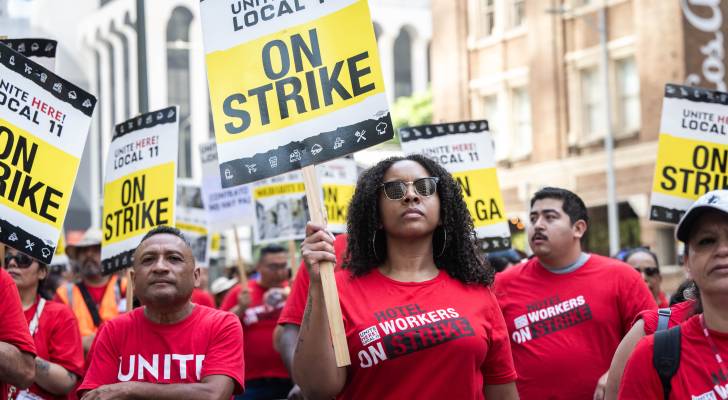If you’re planning a trip to Los Angeles for the 2028 Olympics or the 2026 World Cup, brace yourself: Your hotel stay might soon come with Olympic-sized price tags.
A new Los Angeles ordinance is forcing hotels with more than 60 rooms to pay staff a minimum of $25 an hour as of July, and at least $30 by the time the Olympics begin – nearly double California’s current $16.50 statewide minimum wage.
Hotel workers hailed the law, signed by Mayor Karen Bass in May, as a long-overdue step toward fair pay in one of America’s most expensive cities, especially for the housekeepers and janitors who’ve struggled to keep up with skyrocketing living costs.
Supporters say the measure ensures workers can share in the profits from LA’s tourism boom, but opponents warn it could push hotel prices even higher, just as visitors pour in for some of the world’s biggest events.
LA is preparing for nearly 180,000 out-of-town visitors for the 2026 World Cup and millions are anticipated for the 2028 Olympic Games. Tourism industry professionals expect profits to soar, but critics say the new wages will eat much of the revenue and could spark layoffs, drive up room rates and push tourists away during two of the most high-profile sporting events on the planet.
While the hotel minimum wage may sound high to Americans living in other cities, supporters of the increase say the law is a necessity. According to the MIT Living Wage Calculator, a single adult with no children in LA County needs nearly $28 to cover basic needs, a figure that far eclipses the state’s regular minimum wage.
“Hotel workers often live paycheck to paycheck and are frequently forced to work two or three jobs to provide food and shelter for their families. In many instances, they cannot take time to spend with their children or care for themselves or family when sick,” the ordinance reads. “They also rely on the public sector as a provider of social support services and, therefore, the City has an interest in promoting an employment environment that protects government resources.”
Story Continues
The law’s opponents and hospitality professionals say the wage hike could devastate the city’s tourism industry. Rosanna Maietta, CEO of the American Hotel & Lodging Association, called the law “economically disastrous” in a letter to Mayor Bass.
Those against the bill, many of whom formed a coalition to collect signatures to pause the increase, claim the new wages will raise already pricey room rates, cut deeply into tourism profits, force hotels to close and hurt businesses at tourism-adjacent venues, such as restaurants and bars.
Big events like concerts, conventions and festivals typically trigger dramatic price increases in nearby lodging. At the 2024 Super Bowl in Las Vegas, hotel prices surged 38% nine days out from the game, and during the 2024 Summer Olympics, Paris hotel rates soared 226%.
And in 2024, California mandated an industry-specific wage increase when the state required hourly wages for fast food workers to rise to $20. Opponents of the hotel industry wage increase point to a study by the National Bureau of Economic Research that linked the increase of fast-food wages to a loss of 18,000 jobs.
Read more: Nervous about the stock market? Gain potential quarterly income through this $1B private real estate fund — even if you’re not a millionaire. Here’s how to get started with as little as $10
Events like the Olympics and the World Cup don’t come around very often. If their Los Angeles editions are your one chance to experience them up close, there are ways to cope with expected surge pricing.
The number one rule: Book your lodging as early as you possibly can. Room rates only go up from there, unless you’re willing to gamble on a discount tied to a last-minute vacancy.
Check for open rooms in lodging besides hotels, like Airbnbs, VRBOs or hostels. Check nearby cities for slightly cheaper hotel rooms if you’re comfortable with a longer commute. Plus, make sure to set rate alerts and track price changes.
You can also save money by booking and traveling in groups, and by buying your event tickets as early as possible. Use public transportation to get to and from venues if you can, and avoid car rentals, which will most likely be limited and expensive during peak events. Rideshare prices through apps like Uber or Lyft may also be inflated in high-traffic times.
As a tourist in a city overflowing with visitors, getting travel insurance might be a smart idea. Make sure the plan covers trip cancellations, medical coverage, and especially coverage for your belongings in case they’re lost or stolen.
The hotel wage hike could impact the prices you’ll see for World Cup and Olympic lodging. That means the earlier you plan and lock in your rates, the more control you’ll have over your travel budget.
Stay in the know. Join 200,000+ readers and get the best of Moneywise sent straight to your inbox every week for free. Subscribe now.
This article provides information only and should not be construed as advice. It is provided without warranty of any kind.
